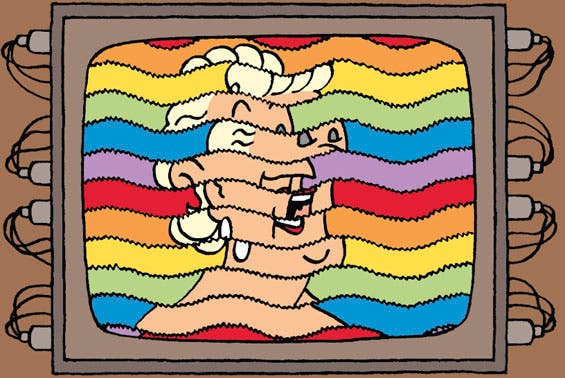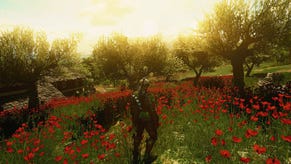My spoilery Firewatch theory
Tintin did it.
Be warned: This article contains spoilers for the entire plot of Firewatch.
The biggest spoiler regarding Firewatch - and this is possibly a sign of how weird narrative games are getting - is that you can't really spoil it. Not in the traditional sense. Delilah, your good buddy on the CB isn't a figment of your imagination, and she isn't a government watcher. The park you're in isn't a Prisoner-style gilded cage. The girls who went missing haven't been murdered by your character Henry in some kind of fugue that the player was not privy to, the scientists up on the hill aren't keeping tabs on your every movement. They aren't up on the hill in the first place. The biggest spoiler regarding Firewatch is that it actually plays things straight. This is a simple domestic tragedy that actually played out long before you arrived, with no need for lights in the sky or government spooks in the bushes. Paradoxically, to know all that is to ruin the game entirely, because the narrative is not all that's really going on here, I suspect. This is a game about plotting, and about the way that plotting can foul you up as a player.
This is my theory anyway. To me, Firewatch is all about the dangerous assumptions the player makes as they play - the writable way we approach readable games. We work through the text-adventure backstory sequence at the start and think: sick wife, childless - Oh man, what a burden this must be for Henry. What a terrible thing to happen to him! The girls down by the lake go missing. Poor Henry - are they trying to frame him? Or is it something worse? We go home and ponder Delilah's tower, bright in the distance. What is her deal? What is she hiding from Henry? Is she watching him? The answer that suggests itself - it's the answer that suggests itself at almost every stage - is: of course she is. Because Henry's special.
Henry's special because he's the main character in a narrative video game. Everything that happens must, in some way, be happening to him.

This is the fallacy that makes Firewatch work, I think. It's the reason that its huge red herrings aren't really red herrings at all, but crucial elements that the developers need to trick you into maintaining your certainty that Henry is at the centre of it all. But is he? Not really. Those kids just went off and got in trouble somewhere else. They probably forgot all about Henry. Those scientists are a con being played by somebody else again whose tragedy is very real but very personal. He's fixated with Henry not because Henry's fantastically interesting, but because Henry's bumbling presence is a pain in the neck. Delilah is lonely. Henry could have been anyone. And Henry's wife? Surely her early-onset dementia is more a story about her than it is a story about Henry? Henry owns his running away, but that's about it.
As neat as this is, there's another layer, of course. In truth, if the trick that allows Firewatch to work is the player's suspicion that a single-player game must revolve around them, the irony is that, to expose this cognitive fallacy, the designers have to devise a game that does revolve entirely around the player. People say Firewatch is non-interactive and confining, which is true, as much as it matters. That's because it's all stage-management: the player is being teased and tantalised and bustled about from one mark to the next, just so the big reveal - that it's all about someone else - can work. In order to make the player understand that they aren't the center of the universe, the designers must build a universe around them. Spoiler: games are weird because players are weird.
I wonder if Campo Santo is familiar with The Castafiore Emerald, a Tintin book from 1963. I read The Castafiore Emerald back in the early 1980s when I read all the others, but returning to it now, I wonder what I actually got out of it when I was eight or nine.

The Castafiore Emerald takes place at Marlinspike Hall - Captain Haddock is laid up and visitors are calling in. There's a gypsy camp nearby, there are strange noises in the attic, things are going missing, a pianist is acting suspiciously and Professor Calculus is probably up to something too. Oh, and a precious jewel has been stolen. The stage is set for a grand mystery, in other words, and true to form, there's even a cliffhanger at the end of every page. Georges Remi was a pro.
But in reality, it amounts to nothing. There is no mystery. The noises in the attic? Owls. The pianist has a gambling habit. The jewel has been stolen by a local magpie. We've been stage-managed through the whole thing. And with good reason. The Castafiore Emerald follows on from perhaps the most personal Tintin book there is, Tintin in Tibet: a tale of rescue and ancient friendship and the elements. The Castafiore Emerald is all about calm. Calm and gentle tricks. Tintin has nothing to solve. Remi has mastered the form, so now he plays with it. The whole thing is the Tintin equivalent of a cryptic crossword.
And interestingly, here's what the dearly missed Harry Thompson has to say about the book in his excellent biography of Remi and Tintin: "To most critics it is the finest Tintin adventure, if not the finest comic book ever written.
"Others say that for all its expertise, it lacks warmth and emotion."
Quite.









